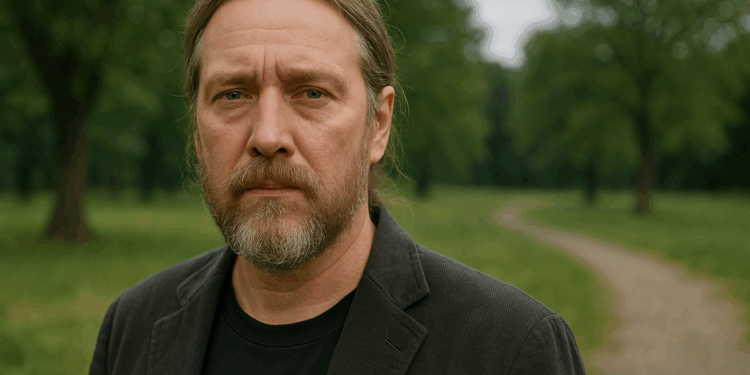To read J.M. Blaine is to tumble into a world where rock stars confess their sins in fast-food parking lots, preachers cry in pawn shops, and the line between salvation and damnation blurs in the flicker of a neon sign. A writer equal parts music journalist, poet, Southern gothic mystic, and late-night confessor, Blaine has carved out a singular place in the literary and cultural landscape: somewhere between Lester Bangs and Flannery O’Connor, with a dash of Tom Waits muttering into a beat-up cassette recorder.
J.M. Blaine doesn’t lead with credentials—he leads with vibe. His interviews and essays read like campfire confessions, stylized fever dreams written between midnight shifts at a haunted truck stop. While many writers approach celebrity interviews like career stepping-stones or transactional press cycles, Blaine turns them into rituals. The musician isn’t just a subject—they’re a mythic figure, a fellow traveler, sometimes even a stand-in for Blaine himself. And Blaine? He’s not there to ask about tour dates. He’s there to ask about why any of it matters.
Raised in Tennessee, Blaine’s work is steeped in the atmosphere of the American South: humid, haunted, and holy in all the wrong places. His prose sweats. It paces. It confesses. And through it all, there’s a voice—distinct, lyrical, disarmingly sincere—that doesn’t flinch when facing the beautiful or the broken. Whether he’s writing about detoxing rock stars, faded churches, late-night diners, or the ghost of Johnny Cash, Blaine delivers each image with reverence and ruin.
For years, he’s been a cornerstone at The Nervous Breakdown, the literary website known for its fusion of memoir, interview, and cultural critique. His longform interviews for the site are beloved for their unusual tone: part sermon, part therapy session, part mixtape. Instead of asking about chart positions, Blaine might ask about the subject’s first broken heart, or what kind of dreams wake them up at 3 a.m. The result is often something far more intimate than journalism—it’s communion.
Blaine’s interview subjects have included an eclectic and electric roster: everyone from metal gods to Americana legends, alt-rock survivors to punk prophets. Yet no matter who he’s talking to, there’s a throughline: he’s listening for the ache behind the art, the redemption beneath the riffs. He’s never cynical. Even when a subject is combative or evasive, Blaine keeps digging—sometimes gently, sometimes with the persistence of a man who believes the truth is in there somewhere, hiding just beneath the last cigarette burn or the final track of the B-side.
Aside from interviews, Blaine has also penned poetry, personal essays, and micro-memoir, all delivered in the same voice: part preacher, part ex-junkie, part road-weary romantic. He writes about addiction, recovery, trauma, music, magic, and moments of small transcendence—finding God in a gas station, salvation in a jukebox, or something like grace at the bottom of a bottle. His personal narratives are stripped down and devastating, built not from confessional self-pity but from hard-earned insight.
There’s something deeply spiritual in Blaine’s writing, though he never uses the word lightly. Whether he’s writing about the sacred or the profane (usually both), Blaine always seems to be searching for meaning in the chaos. Not the neat, tidy kind you put on a Hallmark card—but the messy, contradictory kind that smells like whiskey and diesel fuel and still manages to feel holy. He doesn’t clean up the edges. He doesn’t sand down the scars. He tells the truth and lets it stand there, blinking in the blue light of a 24-hour diner.
He’s also funny—dry, weird, and casually poetic in a way that sneaks up on you. One minute he’s describing a singer’s childhood trauma, and the next he’s riffing on the spiritual implications of The Dukes of Hazzard. It works because Blaine writes like someone who’s seen enough of life to know it’s all connected—the heartbreak, the hope, the heresy.
In a media world that often prizes hot takes and clickbait, J.M. Blaine is the opposite: slow-burning, reverent, and unforgettable. He’s not just writing about culture—he’s writing within it, like a man scrawling psalms on the bathroom walls of America.
He’ll never tell you he’s important. But once you read his work, you’ll start seeing things differently: a little darker, maybe, but also a little more sacred.












